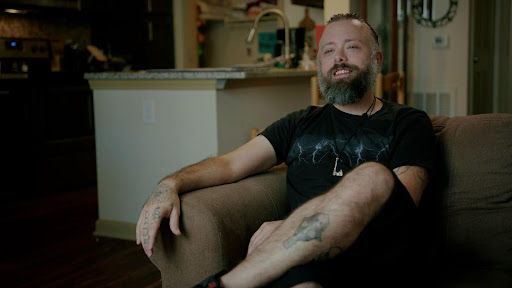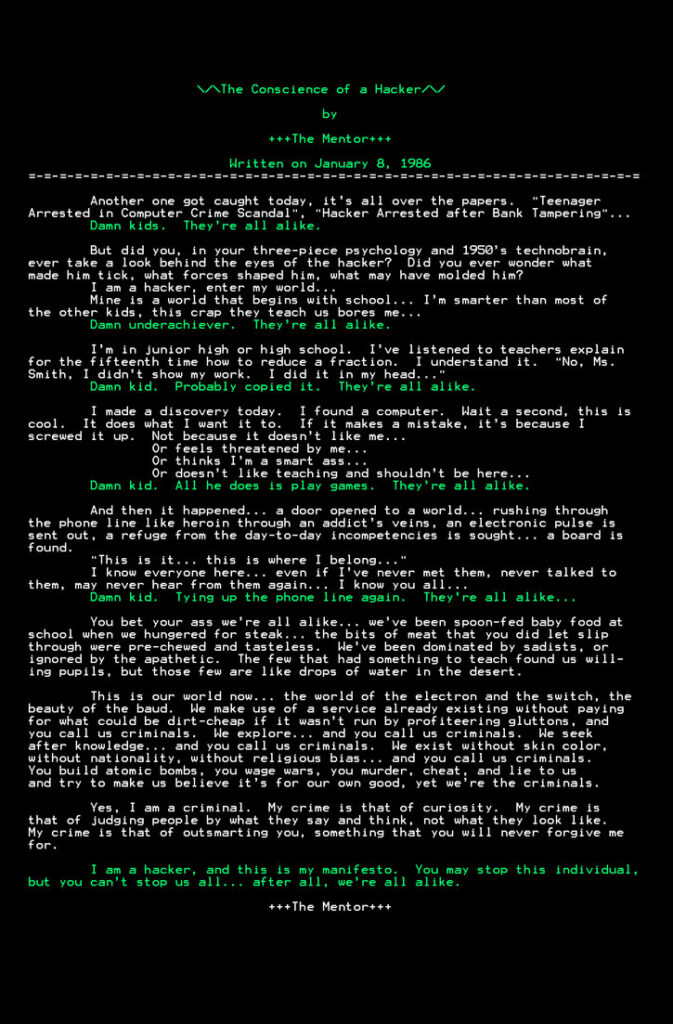
Ghost Exodus attraverso l’esclusivo documentario “How Hacking Ruined My Life: Ghost Exodus Story” prodotto da Silva Rindzevi e visibile sul canale Youtube di CyberNews, ha rotto il silenzio per raccontare la lunga strada percorsa e le conseguenze di ciò che gli ha cambiato la vita per sempre in un modo che “non si può tornare semplicemente indietro e aggiustare tutto”. Vorrebbe poterlo fare. La sua storia vuole essere anche un avvertimento: “la prigione non è fatta per gli hackers, noi non siamo come le altre persone”, soprattutto abbiamo molto di più da dare che stare seduti tutta la vita davanti allo schermo di un computer.
“Se potessi salire su una macchina del tempo e tornare indietro nel tempo, quando ero più giovane, prima di hackerare la Carell Clinic, le parole sarebbero letteralmente queste: Give Up Hacking.”
– Ghost Exodus
“Chi si preoccupa della sofferenza che le persone stanno sopportando?” chiese una volta Jesse William McGraw, alias, Ghost Exodus, ex leader del gruppo hacker chiamato Electronik Tribulation Army (ETA), che per poter rispondere veramente a questa domanda è prima finito dietro le sbarre di una prigione, dopo aver installato un malware nell’infrastruttura della WB Carrell Memorial Clinic in Texas su un dozzina di server, per controllarli da remoto. Ghost Exodus è stata la prima persona – nella storia recente degli Stati Uniti – condannata per un attacco ai sistemi di controllo industriale: “non c’è mai stato un caso come il mio prima, quindi costituisce un precedente di ciò che sarebbe successo a chiunque avesse fatto qualcosa del genere” spiega lui.
Oggi Ghost Exodus attraverso l’esclusivo documentario “How Hacking Ruined My Life: Ghost Exodus Story” prodotto da Silva Rindzevi e visibile sui canali di CyberNews, ha rotto il silenzio per raccontare la lunga strada percorsa per raccontarci chi era ieri, chi è oggi e le conseguenze di ciò che gli ha cambiato la vita in un modo che non si può tornare semplicemente indietro e aggiustare tutto.
Il documentario, che vede al centro Ghost Exodus che si confida con lo spettatore, è uscito il 26 novembre 2023. Dalla sua storia c’è molto da imparare: ci racconta da dove viene, come è cresciuto e da chi, chi era prima e cosa sta già facendo per diventare quella persona che vede nel domani.

Un salto nel tempo da un ragazzo che affascinato dalla tecnologia e dallo spirito incapsulato nel Manifesto Hacker di The Mentor, utilizzava internet come una via di fuga da un mondo in cui non si sentiva relazionato e per il quale “accedere a un sistema informatico era come aprire la porta verso un’altra dimensione”, sino a chi, con la consapevolezza di oggi si mette a nudo per sostenere un hacking responsabile.
“Noi esistiamo senza colore della pelle, senza nazionalità, senza pregiudizi religiosi… e ci chiamate criminali. Voi costruite bombe atomiche, voi provocate guerre, voi uccidete, ingannate e mentite e cercate di farci credere che è per il nostro bene… eppure siamo noi i criminali. Sì, sono un criminale. La mia colpa è essere curioso. Il mio crimine è quello di giudicare le persone per quello che dicono e pensano, non per il loro aspetto. Il mio crimine è quello di averti superato in astuzia, cosa di cui non mi perdonerai mai”.
– The Hacker Manifesto

Tuttavia, anche Ghost Exodus da ragazzo, con il suo gruppo, si batteva per grandi ideali, cercava di combattere il cyberbullismo, i pedofili e i gruppi hacker problematici: combatti per delle nobili cause ma ad un certo punto la causa non è più la cosa più importante, perché l’ego si prende quasi tutto. E questo successe in particolar modo quando il gruppo ETA ebbe a che fare con un gruppo Anonymous.
Il problema è – ci racconta – che, man mano che il tuo potere cresce il confine tra ciò che è giusto e ciò che può essere sbagliato si fa sempre più sfumato. Questo crea conseguenze che non possono essere cancellate, soprattutto quando hai a che fare con i cyber bulli e pensi che “per sconfiggerli dovrai diventare più bullo di loro per farli smettere e arrendere”. Diventa sempre di più una questione legata all’ego più che alla missione e a quel punto puoi salvare la vita di una persona o distruggerla completamente.
Una realtà che Ghost Exodus ci spiega pienamente anche nella contemporaneità – evidenziata nella guerra russa-ucraina e israelo-palestinese – quando il potere degli hacker, che commettono atti di guerra cibernetica, da una parte e dall’altra, combattono alla fine con i loro rivali per sottometterli e distruggerli, distogliendoli da ciò che affermano di difendere e facendogli attaccare target – come infrastrutture critiche – che mettono non solo in pericolo vite umane ma distano mille anni luce dall’obiettivo vero rendendoli poi non diversi ma uguali a tutti “gli altri”. Quasi come se la stessa libertà si identificasse con quel potere oscuro che una volta assaporato è difficile da domare con qualche forma di dipendenza, fino a quando il vero avversario diventa il giocatore stesso.
Tutto questo ti spinge molto lontano dal mondo degli hacker di ieri, spinti dalla curiosità e dalla voglia di testare i limiti dei sistemi programmabili, compresi quelli della stessa società. Oggi infatti il termine hacker sembra parlarci d’altro, soprattutto è spesso, se non sempre, associato a quei criminali informatici che compromettono la sicurezza delle reti a proprio beneficio. Ma un cultura non muore, caso mai cambia e si adatta, forse il modo in cui si organizza dipende anche dal contesto in cui entra, lasciando qualche volta il posto forse in una miriade di culture hacker.
“Siamo stati definiti tinkerers, maghi della programmazione dal MIT e dalla Stanford University. Fino a quando quella descrizione non si è ampliata per comprendere molto di più..”
– Ghost Exodus
Ma la cultura hacker non è morta, molti hacker tengono ancora la loro immagine distinta, un’identità immaginaria che li lega, anche se non si incontrano mai, impegnati da qualche parte – citando Levy (1984) – ad esplorare a ruota libera il potenziale più alto e profondo dei sistemi informatici e rendere l’accesso ai computer e alle informazioni il più libero e aperto possibile.
Caso mai se ne parla davvero poco, cito in questo caso una frase di David Foster Wallace, avendo cura, Wallace non me ne voglia, di sostituire la parola eroismo con la parola hacker: “Signori, benvenuti nel mondo della realtà: non c’è pubblico. Nessuno che applauda, che ammiri. Nessuno che vi veda. Capite? Ecco la verità: il vero [Hacker] non riceve ovazioni, non intrattiene nessuno. Nessuno fa la fila per vederlo. Nessuno se ne interessa”. E mi chiedo allora: l’errore non è forse da imputare alla stessa società?
Tutto questo è raccontato nel bellissimo documentario di Silva Rindzevi, dove un nuovo Ghost Exodus, grazie alla sua valigia piena di errori ma anche di sogni, cerca di responsabilizzare gli hacker di oggi consigliando di agire non in modo emozionale ma attraverso il ragionamento prima di tutto: “la prigione non è fatta per gli hackers, noi non siamo come le altre persone”, soprattutto abbiamo molto di più da dare che stare seduti tutta la vita davanti allo schermo di un computer.
E oggi chi è Ghost Exodus e cosa lo fa sentire davvero libero? Quale è il vero significato di essere hacker? Scopritelo nel documentario, perché Jesse William McGraw ha davvero molto da raccontare ed insegnare.
Oggi Ghost Exodus scrive per CyberNews. È anche co-fondatore di W1nterSt0rm, un gruppo OSINT impegnato nell’educazione e nella lotta ai predatori sessuali online che prendono di mira i bambini. È un oratore pubblico nelle conferenze e aiuta a plasmare gli hacktivisti insegnando loro come avere un’etica da hacktivisti mitigando al tempo stesso il sabotaggio non etico.
Potete leggere anche la storia di Ghost Exodus e il gruppo Electronik Tribulation Army (ETA) qui: RHC intervista Ghost Exodus: la vera storia del black hacker della Elektronik Tribulation Army.
Ti è piaciuto questo articolo? Ne stiamo discutendo nella nostra Community su LinkedIn, Facebook e Instagram. Seguici anche su Google News, per ricevere aggiornamenti quotidiani sulla sicurezza informatica o Scrivici se desideri segnalarci notizie, approfondimenti o contributi da pubblicare.

 Cybercrime
CybercrimeLe autorità tedesche hanno recentemente lanciato un avviso riguardante una sofisticata campagna di phishing che prende di mira gli utenti di Signal in Germania e nel resto d’Europa. L’attacco si concentra su profili specifici, tra…
 Innovazione
InnovazioneL’evoluzione dell’Intelligenza Artificiale ha superato una nuova, inquietante frontiera. Se fino a ieri parlavamo di algoritmi confinati dietro uno schermo, oggi ci troviamo di fronte al concetto di “Meatspace Layer”: un’infrastruttura dove le macchine non…
 Cybercrime
CybercrimeNegli ultimi anni, la sicurezza delle reti ha affrontato minacce sempre più sofisticate, capaci di aggirare le difese tradizionali e di penetrare negli strati più profondi delle infrastrutture. Un’analisi recente ha portato alla luce uno…
 Vulnerabilità
VulnerabilitàNegli ultimi tempi, la piattaforma di automazione n8n sta affrontando una serie crescente di bug di sicurezza. n8n è una piattaforma di automazione che trasforma task complessi in operazioni semplici e veloci. Con pochi click…
 Innovazione
InnovazioneArticolo scritto con la collaborazione di Giovanni Pollola. Per anni, “IA a bordo dei satelliti” serviva soprattutto a “ripulire” i dati: meno rumore nelle immagini e nei dati acquisiti attraverso i vari payload multisensoriali, meno…